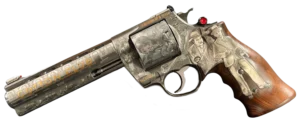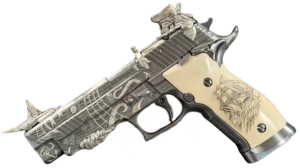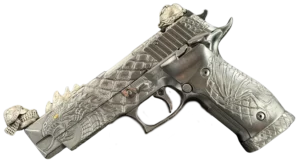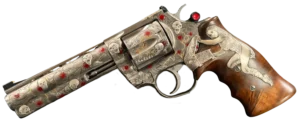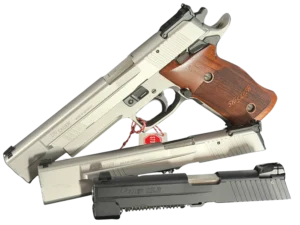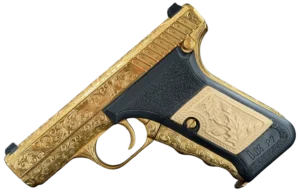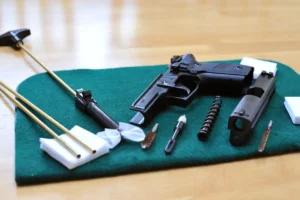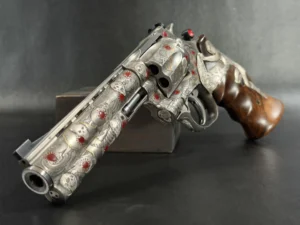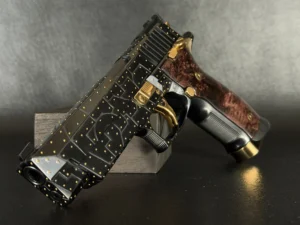Key Takeaways:
- Buying a gun online is legal — but it’s not like ordering socks: You can’t just click “buy now” and have it show up at your door. It’s a multi-step process that includes background checks, shipping to a licensed dealer (FFL), and a decent amount of paperwork. You need to know the rules — both federal and local — or risk getting it very wrong.
- Your local FFL is more than just a middleman — they’re your lifeline: They handle the transfer, run the background check, and make sure everything’s above board. A good FFL can make your purchase smooth. A bad one? Total headache. Choose wisely.
- Do your homework before hitting “checkout”: From shady sellers to confusing specs to state-level restrictions that sneak up on you, there’s a lot that can go sideways. Ask questions. Read the fine print. And if something feels off, trust your gut and walk away.
Let’s be honest — buying a gun online sounds a little weird at first. You picture someone clicking “add to cart” on a pistol like it’s a pair of sneakers, and that’s… not how it works. At least not legally.
But here’s the truth: the internet has totally changed how we shop for everything. Firearms included. You get access to way more options than your local shop can ever hope to stock. You can compare prices, read reviews, track down something rare or vintage — all from the comfort of your couch. It’s kind of a dream for enthusiasts.
That said, buying a gun online isn’t like ordering a pizza. There’s a process. Legal hoops. A few moments where you’ll scratch your head and think, “Wait, can I even do this?” So this guide? It’s here to walk you through it all — the real deal, no fluff.
We’ll talk about how it works, what’s legal (and what absolutely isn’t), how to find sellers you can actually trust, and all the little things no one tells you until it’s too late. Whether you’re a seasoned collector or just trying to buy your first home-defense pistol without screwing it up, read on.
So… Is Buying Guns Online Actually Legal?
Short answer: Yes.
Longer answer: Yes, but there are rules. Big ones.
The Gun Control Act of 1968 laid the groundwork. It says you can buy guns online, but you can’t just have them shipped to your front door like a box of ammo or a hunting vest. The catch? Any gun bought online has to go through a licensed dealer — someone with what’s called a Federal Firearms License (FFL).
Here’s how that plays out:
- You find a gun online — say, a slick Smith & Wesson revolver.
- You buy it.
- The seller ships it to a local FFL dealer near you, not to your home.
- That dealer runs a background check and handles the official transfer.
- Once everything clears, the gun’s legally yours.
A few hard rules to remember:
- You’ve gotta be at least 18 to buy rifles or shotguns. Handguns? That’s 21.
- Background checks are non-negotiable.
- Your state’s gun laws still apply, even if you’re buying from a seller across the country.
- Some guns — like fully automatic ones or short-barreled rifles — need extra paperwork and may be outright banned where you live.
And if you’re not sure whether something is allowed? Ask. Seriously. A quick call to your FFL or local attorney could save you from accidentally committing a felony.
What the Heck Is an FFL, and Why Do You Need One?
Think of an FFL dealer like the bouncer at a really exclusive club. Their job is to check IDs, make sure everyone’s playing by the rules, and throw out anyone who isn’t. Except instead of denying drinks, they’re handing over firearms. (Kind of a big deal.)
The FFL — short for Federal Firearms Licensee — is your middleman in the online buying process. They’re licensed by the ATF and legally allowed to receive, process, and transfer firearms.
So, let’s say you order a rifle online. It gets shipped to Bob’s Guns & Transfers, your chosen FFL. Bob logs it into his system, calls you when it arrives, then has you come in to fill out Form 4473 and do a background check. If everything checks out, Bob hands you the rifle. That’s it.
Some FFLs work out of gun stores, some out of their homes, and others are part of big sporting goods chains. Just make sure you find one you’re comfortable with — more on that in a bit.
How to Buy a Gun Online Without Losing Sleep
Okay, let’s break this down step-by-step.
- Find a legit seller. There are tons of places online to buy guns — dedicated firearms retailers, auction sites like GunBroker, and classified listings. Stick with sellers that look professional, are clearly licensed, and have decent reviews.
- Do your homework. What caliber do you want? What’s the gun for? Don’t rush. Read the fine print, check the photos, and ask questions if anything’s unclear.
- Pick your local FFL. You’ll need to figure out who in your area is going to handle the transfer. The seller might have a list of options, or you can search online. Call ahead — make sure they’re willing to accept transfers and ask about fees. (Some charge $20, others charge $100.)
- Place your order. Buy the gun, then send the seller the contact info or license details of your chosen FFL.
- Wait. The seller ships the gun to the FFL. Once it arrives, the FFL logs it and lets you know it’s ready.
- Go in, fill out the paperwork. You’ll need ID, and you’ll complete ATF Form 4473 — a questionnaire about your eligibility to own a firearm.
- Background check time. Usually takes just a few minutes. Occasionally, it can take longer. If you pass, you walk out with your new gun. If not, well… that’s a different conversation.
That’s it. Complicated? A little. Impossible? Not even close.
State Laws: The Ultimate Curveball
Federal law is just the beginning. States love to add their own flavor to the mix.
Live in California? You’ve got a whole list of “not approved” handguns. New Jersey? Better read up before you buy that AR-style rifle. Hawaii? They don’t even let you buy ammo online without a special permit.
So yeah, check your state’s laws. Some things to look out for:
- Waiting periods
- Magazine capacity limits
- Restrictions on “assault weapons”
- Licensing or permit-to-purchase requirements
Pro tip: Call your FFL before ordering anything weird or exotic. They’ll usually know what flies and what doesn’t in your area.
How to Tell if a Seller is Legit
You know that gut feeling when a website just seems… off? Trust it.
Here’s what to look for:
- A valid FFL number (you can verify this with the ATF if you’re unsure).
- Clear product descriptions and high-quality images.
- Easy-to-find contact info.
- Transparent shipping and return policies.
- Real customer reviews — not just glowing ones, but actual human-sounding feedback.
Avoid sellers who only take sketchy payment methods (Venmo, crypto, gift cards — red flag). And if the deal looks too good to be true? Yeah. It probably is.
Choosing Your FFL: Not All Transfer Dealers Are Equal
Don’t just pick the first name on a list. Take a minute to shop around.
- Ask about transfer fees. They can range wildly.
- Check their hours. Do they do appointments? Walk-ins?
- Read reviews. If someone’s known for ghosting buyers or acting like you’re bothering them, maybe don’t give them your money.
A good FFL makes the whole process smoother. They’ll answer questions, help you navigate paperwork, and actually treat you like a human being — not just a fee.
Background Checks: The Part Everyone Sweats
This is the point where people get nervous, especially if it’s your first time.
Here’s the gist: You show up with your ID, fill out Form 4473, and your FFL submits the info to the FBI’s NICS system. Most of the time, it’s approved in minutes.
If something gets flagged, it might take a few days. Or you might be denied entirely — usually for criminal convictions, restraining orders, or other disqualifiers. If that happens, don’t panic. There’s an appeals process, and mistakes do happen.
Bottom line? If you’re legally allowed to own a gun, you’re probably fine.
A Quick Word on Shipping Rules
Just so we’re crystal clear:
- Firearms are never shipped to your house (unless you have an FFL yourself).
- The seller must verify the FFL they’re shipping to.
- Ammo ships separately.
- Some states and carriers have extra restrictions on certain guns.
You don’t need to be a legal scholar — just pay attention and ask questions if you’re unsure. And always check the tracking number.
Receiving Your Firearm: Don’t Skip the Inspection
When your gun shows up at your FFL, they’ll give it a quick look — make sure the box isn’t busted and the serial number matches.
But you should inspect it, too.
- Is it the model you ordered?
- Any obvious wear or damage?
- Does it match the listing photos?
Once you fill out the paperwork and take it home, returning it gets tricky. Better to catch any issues upfront.
What the Specs Actually Mean
Online listings love to throw specs at you like you’re fluent in ballistics. If you’re not, here’s a cheat sheet:
- Caliber: What kind of ammo it eats.
- Barrel length: Impacts accuracy, recoil, and handling.
- Overall length & weight: Important for carry comfort or shooting posture.
- Capacity: How many rounds it holds. (And remember — some states limit this.)
You don’t need to memorize everything. But if you’re buying a gun you’ve never held before, knowing the specs helps you guess how it might feel in real life.
Pros and Cons of Online Gun Buying
Pros:
- Way more selection than your local shop.
- Competitive prices.
- Great for finding hard-to-locate or discontinued models.
- You can shop in your pajamas.
Cons:
- Can’t hold it or test the trigger.
- You’re relying on photos and trust.
- Transfers and shipping take time.
- Returns? Often tricky or impossible.
At the end of the day, it’s about trade-offs. If you know what you want and you’re buying from someone trustworthy, online can be awesome.
Make Sure It Actually Fits Your Needs
You wouldn’t buy a truck when you need a motorcycle. Same thing here.
What are you buying the gun for? Home defense? Concealed carry? Competition? Collecting?
Each use comes with different “must-haves.” A full-frame steel 1911 might be a dream at the range but a nightmare to carry every day. A polymer subcompact might be easy to tuck away but less fun for target shooting.
Match the tool to the job.
Safe Payment and Returns (Yes, You Should Care)
Pay with a method that protects you — like a credit card. Most reputable sellers accept them. If they only want payment apps or sketchy wire transfers, run.
And always — always — read the return policy. Some sellers offer returns if something arrives broken. Others have a strict “all sales final” stance. Know before you click “buy.”
Reviews, Red Flags, and Not Getting Screwed
Reviews aren’t gospel, but they’re helpful. Look for:
- Recurring complaints (like poor communication or bait-and-switch listings).
- How the seller responds when something goes wrong.
- Patterns. One bad review? Eh. Ten in a row? Yikes.
Trust your gut. If something feels off, there’s probably a reason.
Final Thoughts: You’ve Got This
Buying a gun online isn’t some shadowy, complicated thing. But it’s not quite simple either. It lives in that weird middle ground where convenience meets caution.
You’ll be fine. Really. As long as you:
- Know the law.
- Choose sellers and FFLs you trust.
- Ask questions.
- Stay patient.
It’s not just about getting the gun — it’s about doing it right. Because the responsibility doesn’t start when the gun gets handed to you. It starts the moment you decide to buy it.
Now go find that perfect piece for your collection. Or your nightstand. Or your next hog hunt. Whatever it is — make it count.
Frequently Asked Questions
Yes. Totally legal — if you follow the rules. You buy it online, but it gets shipped to a licensed dealer (an FFL), who runs a background check and transfers it to you. No guns magically appearing at your doorstep. That’s a felony waiting to happen.
Think of an FFL (Federal Firearms License holder) as the legal go-between. They’re the ones who receive your gun, make sure everything checks out, and hand it over after the background check. Without an FFL? No transfer, no gun, no dice.
Yup. No exceptions. When your gun shows up at the FFL, you fill out a form (4473), and they run a background check through the NICS system. If you’re clean, you’re good. If not… well, it gets complicated fast.
Nope. Not ever (unless you’re an FFL yourself). All firearms have to be shipped to an FFL dealer, who handles the transfer in person.
Start with a quick Google search or ask your local gun shop. Look for solid reviews, fair fees, and someone who doesn’t treat you like you’re interrupting their lunch. Bonus points if they actually answer the phone.



